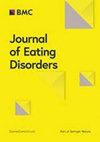Reliability and validity of the modified Yale Food Addiction Scale 2.0 (mYFAS 2.0) in a sample of individuals with depressive disorders
IF 3.5
3区 医学
Q2 NUTRITION & DIETETICS
引用次数: 0
Abstract
Food addiction (FA) is strongly associated with depressive symptoms. The reliability and validity of the Modified Yale Food Addiction Scale 2.0 (mYFAS 2.0) were not previously determined in clinical samples in Brazil. This study aimed to assess the psychometric properties of the Brazilian version of the mYFAS 2.0 in adult individuals with depressive disorders. The data stems from a survey investigating FA in a convenience sample of subjects diagnosed with a depressive disorder. Participants answered mYFAS 2.0 and scales for binge eating, depressive and anxiety symptoms, and alcohol and nicotine use. Height and weight were measured to calculate the Body Mass Index (BMI). We evaluated the factor structure, reliability, convergent, discriminant, criterion, and incremental validity. The sample encompassed 303 participants with a mean age of 37.03 ± 11.72 years, 84.16% of whom were women. The Cronbach’s alpha for the mYFAS 2.0 was satisfactory (alpha = 0.915). The best goodness-of-fit model was a single factor, and mYFAS 2.0 showed convergent validity with binge eating and discriminant validity with the alcohol and nicotine use measures. Food addiction presented a weak positive correlation with depressive and anxiety symptoms and BMI. Three food addiction symptoms provided the best balance between sensitivity (80.95%) and specificity (74.81%). Incremental validity over binge eating symptoms was confirmed (t = 4.040, β = 0.681, p < 0.001). The Brazilian mYFAS 2.0 performed satisfactorily in this clinical sample of participants with a depressive disorder. These findings suggest it may be a brief, useful, and valid food addiction screening tool for this group. Food addiction is a dysfunctional consumption of energetically dense, hyper-palatable, and ultra-processed foods that may lead to addictive behaviors. It is associated with mental disorders such as eating, mood, and anxiety disorders, which negatively impact the quality of life for individuals affected. Therefore, healthcare providers need to assess food addiction. The Modified Yale Food Addiction Scale 2.0 (mYFAS 2.0) is a brief instrument consisting of 13 questions developed to assess FA. Although it was previously adapted for Brazilian Portuguese in a non-clinical sample, this is the first study in Brazil to investigate this tool in a psychiatric sample. The main aim of our study was to evaluate the psychometric properties of the Brazilian version of the mYFAS 2.0 in individuals with a Depressive Disorder. The results suggested that mYFAS 2.0 had satisfactory psychometric properties in this sample, and it may be a brief, useful, and valid scale to screen food addiction in individuals with depressive states.改良版耶鲁食物成瘾量表 2.0(mYFAS 2.0)在抑郁障碍患者样本中的信度和效度
食物成瘾(FA)与抑郁症状密切相关。改良版耶鲁食物成瘾量表 2.0(mYFAS 2.0)的可靠性和有效性以前未在巴西的临床样本中进行过测定。本研究旨在评估巴西版 mYFAS 2.0 在患有抑郁症的成年人中的心理测量特性。数据来源于一项调查,调查对象是被诊断患有抑郁障碍的方便样本。受试者回答了 mYFAS 2.0 以及有关暴饮暴食、抑郁和焦虑症状、酒精和尼古丁使用情况的量表。测量身高和体重是为了计算身体质量指数(BMI)。我们对因子结构、信度、收敛效度、区分效度、标准效度和增量效度进行了评估。样本包括 303 名参与者,平均年龄(37.03 ± 11.72)岁,其中 84.16% 为女性。mYFAS 2.0 的 Cronbach's alpha 值令人满意(alpha = 0.915)。最佳拟合模型为单因素,mYFAS 2.0 与暴饮暴食具有趋同有效性,与酒精和尼古丁使用测量具有区分有效性。食物成瘾与抑郁症状、焦虑症状和体重指数呈弱正相关。三种食物成瘾症状在灵敏度(80.95%)和特异性(74.81%)之间达到了最佳平衡。暴饮暴食症状的递增有效性得到了证实(t = 4.040,β = 0.681,p < 0.001)。巴西 mYFAS 2.0 在抑郁障碍临床样本中的表现令人满意。这些研究结果表明,对于这一群体来说,它可能是一种简短、有用且有效的食物成瘾筛查工具。食物成瘾是指对高能量、高口感和超加工食品的机能障碍性消费,可能导致成瘾行为。它与饮食、情绪和焦虑症等精神障碍有关,对患者的生活质量造成负面影响。因此,医疗服务提供者需要对食物成瘾进行评估。修订版耶鲁食物成瘾量表 2.0(mYFAS 2.0)是一个简短的工具,由 13 个问题组成,用于评估食物成瘾。虽然该量表曾在非临床样本中被改编为巴西葡萄牙语,但这是巴西第一项在精神病学样本中调查该工具的研究。我们研究的主要目的是评估巴西版 mYFAS 2.0 在抑郁症患者中的心理测量特性。结果表明,mYFAS 2.0 在该样本中具有令人满意的心理测量特性,它可能是一种简短、有用且有效的量表,可用于筛查抑郁症患者的食物成瘾。
本文章由计算机程序翻译,如有差异,请以英文原文为准。
求助全文
约1分钟内获得全文
求助全文
来源期刊

Journal of Eating Disorders
Neuroscience-Behavioral Neuroscience
CiteScore
5.30
自引率
17.10%
发文量
161
审稿时长
16 weeks
期刊介绍:
Journal of Eating Disorders is the first open access, peer-reviewed journal publishing leading research in the science and clinical practice of eating disorders. It disseminates research that provides answers to the important issues and key challenges in the field of eating disorders and to facilitate translation of evidence into practice.
The journal publishes research on all aspects of eating disorders namely their epidemiology, nature, determinants, neurobiology, prevention, treatment and outcomes. The scope includes, but is not limited to anorexia nervosa, bulimia nervosa, binge eating disorder and other eating disorders. Related areas such as important co-morbidities, obesity, body image, appetite, food and eating are also included. Articles about research methodology and assessment are welcomed where they advance the field of eating disorders.
 求助内容:
求助内容: 应助结果提醒方式:
应助结果提醒方式:


